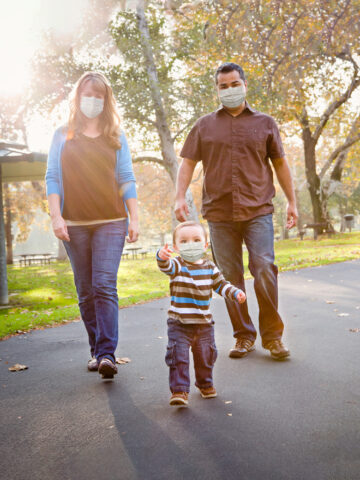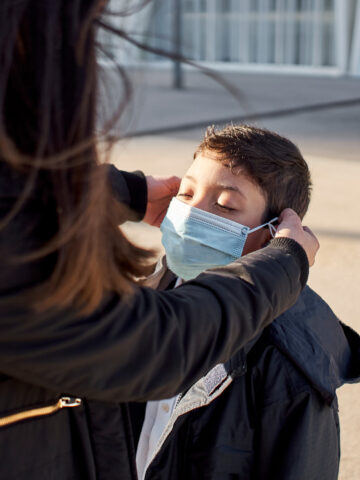We know that all parents want to keep their children healthy and safe. Although COVID-19 affects different people in different ways, research has shown that obesity puts children – and adults – at increased risk of severe illness.
According to 2016 data from the Let’s Get Healthy California task force, 20.2% of children age 0-5 were overweight for their age, 12.9% of children age 6-11 were overweight, and 40.7% of adolescents age 12 to 17 were overweight or obese.
Following your doctor’s advice on nutrition and physical activity can help protect you from severe illness associated with COVID-19 – in addition to physical distancing, washing your hands frequently and wearing a facial covering.
Here are some healthy eating and exercise tips for your family. If you have questions about your family’s health, call your doctor.
Healthy eating tips
Limit the amount of added sugar your child eats or drinks.
- The American Heart Association recommends that children ages 2 to 18 should have less than 25 grams of added sugar per day, and drink less than one 8-ounce sugary drink per week.
- 25 grams of sugar equals 6 teaspoons, or about 100 calories. The average American child consumes 19 teaspoons of added sugar daily, or more than 300 extra calories.
- Here’s tips from a CHOC registered dietitian on limiting added sugar in your family’s diet.
Eat Well on a Budget
Eating healthy does not have to be expensive. A CHOC registered dietitian offers these tips for parents who want to follow a balanced diet and stay on budget:
- Plan before you shop. Compare prices and read grocery flyers to determine what’s on sale. Create a menu for your family for a week at a time, building on foods you already have at home
- Eat before you shop. Going shopping hungry can lead to spontaneous and unhealthy purchases.
- Prepare double or triple batches of meals you can freeze and eat later on days you will be too busy to cook a healthy meal.
- Here’s more tips on eating healthy on a budget.
Tips for Picky Eaters
Is your toddler a picky eater? Dr. Eric Ball, a CHOC pediatrician, offers these tips:
- Don’t let toddlers decide what food they are served. Parents control the quality of food offered to children. Toddlers control the quantity that they eat.
- It’s normal for toddlers to have meals – or even days – when they eat little.
- Mealtime will be more successful if you avoid letting your toddler fill up on liquid calories or snacks. At snack time, give your toddler two acceptable options.
- Here’s more tips from Dr. Ball on how to deal with a toddler who is a picky eater.
Meal Prep Tips for Busy Parents
When life gets busy, planning and making homemade meals can easily fall to the bottom of your to do list. These healthy meal prep tips for busy parents, from a CHOC registered dietitian, can help.
- The USDA’s MyPlate program is a great place for recipe ideas. It also offers tips for meeting your nutritional goals. Find tips to incorporate each food group into your diet, and what foods to limit, such as salt and saturated fat.
- The website also offers the MyPlate Plan – parents can enter the gender, weight, height and activity for their children and get specific energy needs. Then, you can choose the calorie level and servings and suggestions for each food group to meet your child’s calorie needs. Here’s an example MyPlate Plan.
- Learn more about the healthy eating benefits of the MyPlate program.
Get kids involved in the kitchen
- Preparing meals together can help children develop healthy eating habits. Talk about the ingredients, and how they smell, taste, look and feel. Be creative when offering new foods. You can make bugs with fruit kabobs or faces with vegetables on homemade pizza.
- Children learn by example. If they see parents and siblings preparing and trying healthy food, they are more likely to accept a new food.
- Make mealtimes family time. Children who eat meals with their families at home have higher quality diets and higher intake of fruits and vegetables.
- Here’s more tips on developing healthy eating habits in kids.
Drink enough water
How much water should children drink every day? We recommend they drink the number of 8-ounce glasses equal to their age, with a maximum of eight glasses for children age 9 and older. For example, a 3-year-old should drink three 8-ounce glasses of water per day. Here’s a helpful chart to keep track of this advice.
Promote physical activity
Daily exercise helps keeps kids fit. Try to get at least one hour every day. This doesn’t need to be all at once. It can be short bursts of activity for 15 minutes at a time.
Be active with your children. They are more likely to stay active when they are having fun with their parents. Tap into activities or sports they’re already interested in, that you can do while respecting physical distancing, such as waking the dog, playing catch, soccer, riding a bike, or setting up an obstacle course in your backyard.
Limit screen time
Screen time is considered watching TV, playing video games or using a computer, tablet or smartphone. The American Academy of Pediatrics offers these screen time recommendations for kids:
- 18 months or younger – no screen time is best. An exception is live video c hat with family and friends.
- 18 months to 2 years – limit screen time and avoid solo use. Choose high-quality education programming and watch along with your kids to ensure they understand what they’re watching.
- 2 to 5 years – limit screen time to an hour per day. Parents should watch with their kids to make sure kids understand what they’re watching and can apply it to their world.
- Age 6 and older – parents should place consistent limits on screen time. Don’t let screen time affect sleep, exercise or behavior.
Call your doctor
If you have questions about your child’s weight, speak to your doctor. Doctors use body-mass index charts, based on age and gender, to determine a range of healthy weight for kids.
Get more expert health advice delivered to your inbox monthly by subscribing to the KidsHealth newsletter here.
Learn more about COVID Vaccines for Children and Teens
Get answers to your frequently asked questions – and some peace of mind – with this complete guide to COVID-19 vaccines from CHOC pediatric experts.





